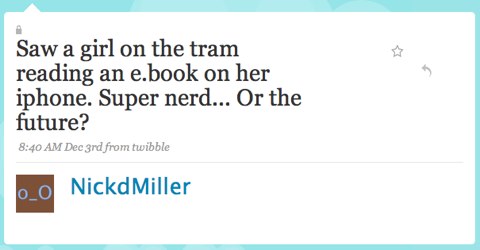Christmas is almost here again, which in my family means the writing of ‘Christmas Lists.’ In an effort to make the season as straightforward as possible for our close relatives without being so crass as to give money, we all publish lists of the presents we'd like to receive. Nobody is forced to stick to the list in the event of a sudden moment of inspired shopping synchronicity, but neither is anyone considered unimaginative for sticking to the script.
What has struck me over the last few years is how much of all our lists have always been taken up by IP: CDs (once cassette tapes), DVDs (once VHS tapes, now Blu-Ray) and books. Which makes me wonder what we are going to do for physical gifts ten years from now? What happens to Christmas when buying a CD, DVD or a book in physical form is just so twentieth century1?
CDs are already on their way out. I still buy them, but only for two reasons2:
- Compact discs have no DRM, and thus will continue to function even if the manufacturer goes out of business or chooses not to support them any more.
- Digital files are a lot easier to lose than shiny plastic discs, and despite keeping careful, permanent track of your purchases, download services such as iTunes mysteriously lack the option to re-download stuff you've already bought.
Both these problems are temporary: the first because music publishers are realising that either you sell without DRM or you hand Apple absolute control of your industry, the second because backing up data is becoming a lot easier, and backing up your important stuff to the cloud will hit the mainstream any day now. So we'll give the CD 5-10 Christmases to fade away.
The DVD isn't going to fare much better. The Internet is eating video even faster than it is eating recorded music. Blu-Ray is fighting back the tide, but it can not last for long. The difference in quality between an HD show from a Blu-Ray disc and one downloaded onto an AppleTV is so slight that you would only care about it in the most visually spectacular shows, and there is no reason not to assume that bandwidth and compresion technologies will both advance sufficiently over the next few years to render BD's advantage non-existent.
Which leaves the oldest of all the technologies, the book.

Christmas also means it's about time for my annual argument with my mother and brother about the future of the book as a physical medium. Don't get me wrong, I acknowledge books have a lot of advantages:
- You don't have to charge them or replace their batteries
- You can lend someone a book without worrying about the copyright implications
- It doesn't matter too much if you get sand in them on the beach, or spill some of the recipe on the page of your cookery book
- Reading a book is still easier on the eyes than any digital alternative
- You can scribble in the margins, or if you're lucky have the author scribble on the title page
- Many people are emotionally attached to the book as a medium. (Or to be a little less charitable, people fetishise the printed word)
Books are by no means perfect, though:
- Printing a book and shipping it to its destination is expensive, and is only getting more so
- At any one time, the vast majority of books are out of print.
- Books are heavy
- Even an occasional reader such as myself ends up devoting a ridiculous amount of living space to the storage of books
Ebook technology is getting better. The devices we have today are still not going to convince anyone but the hyper-enthusiastic early adopters, but technology has a habit of accelerating dramatically once there is just a little demonstration of demand. At the same time, the population of book-fetishists will start falling into the same niche as people who buy CDs because they like having the liner-notes.
It'll hang on longer than the rest, but I'm giving the book twenty years.
----
1 the question of what happens to record and book stores is possibly a more serious one, but really isn't my problem. So far, record stores attempts to "go digital" by installing mp3 kiosks, or putting little cards in the CD racks to represent digital albums are little more than cute ways of rearranging the deckchairs
2 To answer the unspoken question: “3. Because I feel that paying for music is the right thing to do.”